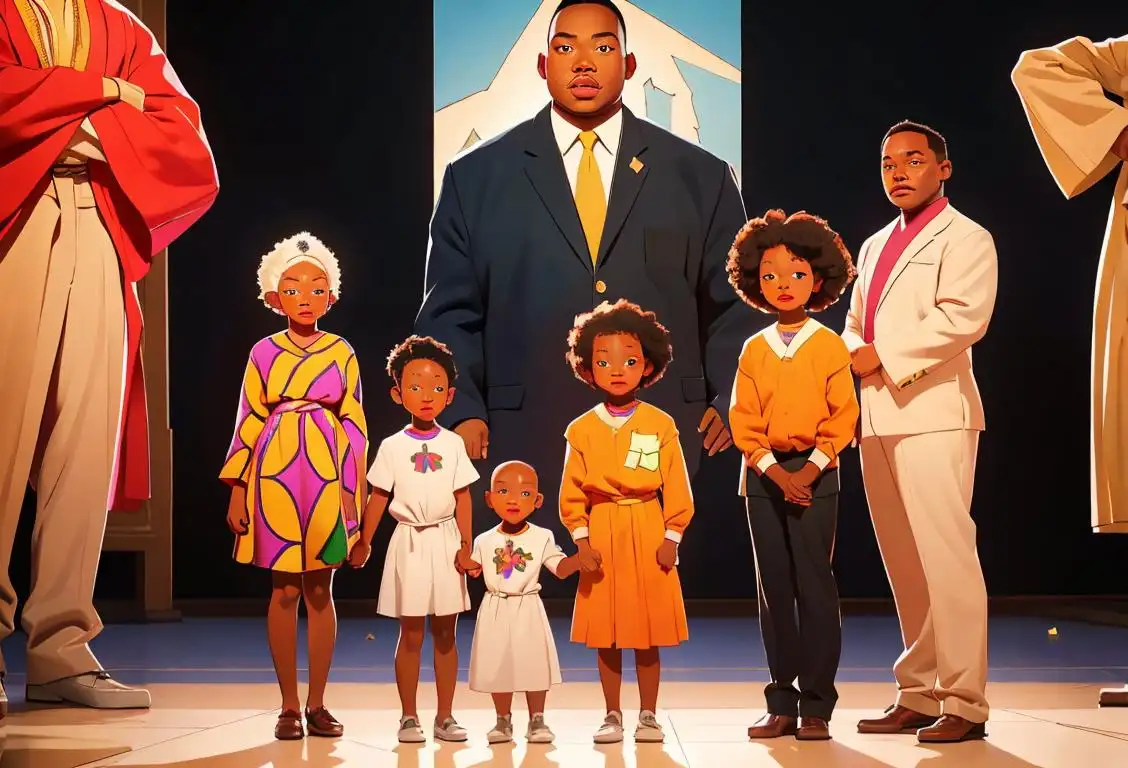National Library Awareness Day

Welcome to National Library Awareness Day! Let's dive into the world of books, knowledge, and the wonderful libraries that bring them all together.
When is Library Awareness Day?
It's national library awareness day on the 2nd October.
A Brief History of National Library Awareness Day
Did you know that National Library Awareness Day is celebrated on the 2nd of October? This day is all about recognizing the importance of libraries in our communities and promoting awareness about the resources they offer.
The origins of this day can be traced back to the rise of the internet and digital media. As technology advanced, people started favoring online sources over traditional libraries for gathering information. This led to concerns about the decline of libraries and their relevance in the modern world.
In response to this trend, National Library Awareness Day was established to remind people of the value libraries bring to society. It aims to highlight the vast collection of books, periodicals, research materials, and other resources that libraries offer, both in print and online.
Celebrating National Library Awareness Day
On National Library Awareness Day, libraries across the country organize a variety of events and activities to engage their communities. From author talks and book discussions to workshops and storytelling sessions, there's something for everyone to enjoy.
Libraries also use this day as an opportunity to showcase their unique features. Some have digitized rare and valuable manuscripts, making them accessible to a wider audience. Others have organized exhibitions to display the local history and culture.
It's not just about books either! Many libraries have expanded their offerings to include audiovisual materials, e-books, and online databases. With these resources, they can cater to the diverse interests and needs of their patrons. So whether you're into classic literature or the latest blockbuster films, your local library has you covered!
Did You Know?
Did you know that the world's largest library is the Library of Congress in Washington, D.C.? It has over 167 million items in its collection, including books, manuscripts, maps, and photographs. If you visit, don't forget to check out the Gutenberg Bible on display, one of the most famous books in history!
History behind the term 'Library Awareness'
1850
Birth of the modern public library
In the mid-19th century, the modern public library movement began to take shape. The concept of the library as a free and open space for all members of the community to access knowledge and information started to gain prominence. Libraries were seen as crucial institutions for education, enlightenment, and social progress.
1895
Invention of the term
In 1895, the term 'library awareness' was first coined by librarians as a way to promote the importance and value of libraries in communities. It aimed to create awareness about the resources, services, and educational opportunities that libraries offered to the public.
1804
The birth of public libraries
In 1804, the first modern public library was established in the United States. The term 'library awareness' as we know it today did not exist, but this pivotal moment marked the beginning of organized efforts to make books and knowledge accessible to all members of society. The opening of the Boston Public Library set the stage for the growth of public libraries across the country and laid the foundation for the importance of library awareness in the future.
1896
The Birth of National Library Week
In 1896, the American Library Association (ALA) was founded. The ALA is the oldest and largest library association in the world, dedicated to promoting libraries and librarianship. As libraries began to play a vital role in society, the ALA recognized the need for creating awareness about the importance of libraries. They initiated National Library Week, an annual celebration to highlight the value of libraries and the services they offer.
1800
Emergence of public libraries
The term 'library awareness' finds its roots in the 19th century with the emergence of public libraries. During this time, libraries became more accessible to the general public, offering a wide range of books and resources for people to borrow and use. The concept of promoting awareness about the availability and importance of these libraries began to take shape.
1850
The birth of public libraries
In 1850, the first modern public library, the Boston Public Library, was established. This marked an important milestone in the promotion of knowledge and literacy among the general public. Libraries became accessible to people from all walks of life, providing them with a place to explore and learn.
1876
Origin of public libraries
The first step towards library awareness can be traced back to 1876 when the first public library was established in Manchester, England. This marked the beginning of a movement to provide free access to books and knowledge to the general public.
1876
The Birth of the Modern Public Library
The concept of library awareness can be traced back to the establishment of the modern public library in 1876. The first public library, known as the Boston Public Library, was founded in Boston, Massachusetts, with the intention of providing free access to knowledge and promoting literacy within the community. This marked a significant milestone in making books and information more accessible to the public, thus initiating the need for library awareness.
1876
The Birth of Library Awareness
In 1876, the term 'library awareness' emerged as libraries began to recognize the need to promote their resources and services. This was a response to the growth of public libraries and the desire to encourage literacy and access to knowledge. Libraries started organizing events and campaigns to raise awareness about their collections, programs, and services.
1876
The Birth of Library Awareness
In 1876, the term 'library awareness' was first coined, marking the beginning of a new era in the promotion of libraries. As the concept of public libraries started to gain traction, educators and librarians recognized the need to create awareness and advocate for the importance of libraries in communities.
1876
The First Public Library
In 1876, the first public library in the United States was established in Peterborough, New Hampshire. This marked the beginning of the movement to make books and knowledge accessible to all members of the community. The library became a gathering place for people to learn, exchange ideas, and explore new perspectives.
1957
Library Week in the United States
In 1957, the American Library Association (ALA) established 'National Library Week' in the United States. This week-long event aimed to promote the use of libraries, encourage reading, and raise awareness about the value of libraries in communities. This organized effort gave rise to the need for 'library awareness' as a term to highlight the importance of libraries and their impact on society.
1958
National Library Week
The concept of library awareness gained significant traction in 1958 when the American Library Association (ALA) established the first National Library Week. This annual event aimed to promote and support libraries by highlighting their contributions to society and encouraging people to visit their local libraries.
1929
Library Publicity Week
In 1929, the American Library Association (ALA) launched the first-ever Library Publicity Week. The aim was to raise awareness about the importance of libraries and to encourage people to explore the wealth of resources available. This initiative helped to highlight the role of libraries as essential institutions in promoting literacy, education, and community engagement.
1885
Library Associations Promote Awareness
In 1885, the American Library Association (ALA) was founded. The ALA took on the responsibility of promoting library awareness across the United States and advocating for the importance of libraries as educational and cultural institutions. They aimed to raise awareness about the valuable resources and services libraries offer, encouraging people to utilize their local libraries and participate in community library programs.
1850
Advocacy for library funding
As public libraries became more common throughout the 19th century, there arose a need for advocacy in order to secure adequate funding and resources. In 1850, Thomas Carlyle, a Scottish philosopher, and writer, called for greater awareness of the importance of libraries in society. His influential essay, 'Chartism,' emphasized the need for government support and public awareness to ensure that libraries could fulfill their educational and social roles. Carlyle's advocacy work laid the groundwork for future library awareness campaigns.
1887
Melvil Dewey's Classification System
In 1887, Melvil Dewey introduced his influential Decimal Classification System. This system revolutionized how libraries organized their collections, making it easier for users to locate desired materials. Dewey's system further contributed to library awareness by standardizing the organization and facilitating the accessibility of information.
1958
Expanding Library Awareness
In 1958, the American Library Association expanded its efforts to promote library awareness by designating a specific day during National Library Week as National Library Workers Day. This day acknowledges and honors the contributions of library workers who play a crucial role in making libraries enjoyable and accessible to all. It aims to bring attention to the hard work and dedication of librarians, library technicians, and support staff.
1957
American Library Association's involvement
The American Library Association (ALA) played a significant role in promoting library awareness. In 1957, the ALA initiated National Library Week, an annual celebration dedicated to promoting the importance of libraries in communities. This week-long event aimed to create awareness about the resources, services, and programs offered by libraries across the United States.
1890
Dewey Decimal Classification System
In 1890, Melvil Dewey revolutionized library organization by creating the Dewey Decimal Classification System. This system classified books into specific subject categories, making it easier for library staff and users to locate relevant materials. It greatly contributed to library awareness by promoting efficient book management and accessibility.
1938
The American Library Association's Efforts
In 1938, the American Library Association (ALA) took a significant step in promoting library awareness by establishing the first Library Week. Aimed at engaging the public and advocating for libraries, this initiative encouraged communities to embrace their local libraries and recognize their importance in society. Library Week eventually expanded into what is now known as National Library Week, celebrated in the second week of April.
1958
The American Library Association's initiative
In 1958, the American Library Association (ALA) made a significant effort to raise awareness about the importance of libraries and their role in society. The ALA recognized the need to promote libraries as not just repositories of books, but as vital institutions that foster cultural enrichment, education, and community engagement.
1979
Library Lovers Month
In 1979, Library Lovers Month was established as a way to extend the spirit of library awareness beyond National Library Week. February was chosen as the month for this celebration to coincide with Valentine's Day, as it symbolizes the love and appreciation people have for libraries. Library Lovers Month encourages people to show their support by visiting libraries, advocating for library funding, and spreading the word about the importance of reading and education.
1985
Formation of Library Awareness Program
In 1985, the Library Awareness Program was formed as a collaboration between the ALA and the Advertising Council. This program aimed to educate the public about the resources and services offered by libraries across the nation. 'Library awareness' became a key phrase associated with the program, emphasizing the need to promote the utilization of libraries and enhance public understanding of their benefits.
1974
The birth of Library Awareness Week
In 1974, the American Library Association expanded its efforts by officially establishing Library Awareness Week. This annual observance aimed to generate public interest in libraries and encourage people to take advantage of the resources and services they offer. Library Awareness Week provided a platform for libraries to showcase their activities, host special events, and advocate for increased support.
1920
Library Associations Promote Awareness
During the 1920s, library associations began actively advocating for library awareness. The American Library Association (ALA) and other professional organizations initiated campaigns and outreach efforts to promote the value of libraries and encourage their use. This period marked a turning point in raising public awareness and fostering appreciation for libraries.
1957
International Interaction: UNESCO's Role
In 1957, UNESCO (United Nations Educational, Scientific and Cultural Organization) recognized the significance of libraries in promoting education and cultural exchange. They established the Universal Bibliographic Control (UBC) program, which aimed to enhance library awareness on an international scale. The UBC program focused on standardizing bibliographic information and fostering collaboration among libraries worldwide, facilitating the seamless sharing of resources and knowledge.
1876
Melvil Dewey and the Dewey Decimal System
In 1876, Melvil Dewey, an American librarian and educator, introduced the Dewey Decimal Classification system. This system revolutionized library organization and classification, making it easier for library users to find books and resources. Dewey's innovative approach not only improved the accessibility of libraries but also contributed to the need for library awareness. Users needed to be aware of and familiar with the Dewey Decimal System in order to navigate libraries effectively.
1973
International School Library Month
Recognizing the importance of libraries in educational institutions, the International Association of School Librarianship (IASL) designated October as International School Library Month in 1973. This initiative aimed to raise awareness about school libraries and the vital role they play in fostering literacy, information literacy, and a love for reading among students.
1958
National Library Week
In 1958, Library Publicity Week was expanded and renamed as National Library Week. This change reflected the growing recognition of libraries as crucial components of society. National Library Week became an annual event celebrated across the United States, emphasizing the role of libraries in fostering intellectual curiosity, cultural enrichment, and lifelong learning.
1974
Library Awareness Week
The term 'library awareness' gained further prominence in 1974 with the introduction of Library Awareness Week. This annual event, often observed in April, was established to raise awareness about libraries and their contributions to society. The week-long celebration includes various activities, such as book exhibits, author visits, and educational programs, all aimed at promoting library usage and highlighting the resources available to the public.
1945
Library Bill of Rights
The American Library Association (ALA) adopted the Library Bill of Rights in 1945. This document asserted the principles of intellectual freedom, equity of access, and privacy for library users. It highlighted the importance of preserving democratic values and ensuring that libraries are safe spaces for exploring diverse perspectives.
1974
Expanding the awareness internationally
Recognizing the global significance of libraries, the International Federation of Library Associations and Institutions (IFLA) launched its own campaign to raise library awareness worldwide. In 1974, IFLA designated October 1st as International Day of Libraries, a day to celebrate the invaluable contributions and role of libraries in society. This initiative aimed to encourage people from different countries to come together and appreciate the value of libraries.
1997
American Library Association's Library Advocacy Day
To further enhance library awareness, the American Library Association introduced Library Advocacy Day in 1997. This annual event encourages library professionals and advocates to engage with legislators, policymakers, and the general public to advocate for libraries, their funding, and the importance of information access for all.
1958
National Library Week
In 1958, the first National Library Week was celebrated in the United States. Sponsored by the ALA and the American Book Publishers, this annual event aimed to raise awareness of libraries and their services. National Library Week continues to this day, highlighting the critical role libraries play in education, literacy, and community.
2009
National Library Week becomes a global celebration
National Library Week, initially observed in the United States, gained international recognition in 2009. The event expanded to be celebrated globally as 'Library Week' or 'Library and Information Week.' The term 'library awareness' continued to evolve, encompassing a broad range of efforts worldwide, including initiatives to raise awareness about libraries, their services, and their impact on literacy and education.
1985
American Library Association and Library Awareness Month
In 1985, the American Library Association designated April as Library Awareness Month. This month-long observance aimed to further enhance public awareness and appreciation for libraries. It provided an opportunity to highlight the various services and resources offered by libraries, including but not limited to books, digital materials, research assistance, and educational programs.
1994
Expanding Library Awareness
With the rise of technology and the internet, libraries faced the challenge of adapting to changing information and communication landscape. In 1994, the American Library Association initiated the 'Library Awareness Program' to address these challenges. The program focused on leveraging technology to make libraries more accessible, providing online resources and digital services while continuing to emphasize the importance of traditional library services and resources.
2000
Transition to Library Awareness Month
By the year 2000, the American Library Association revised the concept of Library Awareness Week and transformed it into Library Awareness Month. This change allowed for prolonged engagement and a broader range of events and activities throughout the entire month. Libraries had more time and flexibility to plan and execute initiatives to promote their services to the public.
2001
International School Library Month
In 2001, International School Library Month was introduced by the International Association of School Librarianship (IASL). Recognizing the impact of school libraries on students' educational development, this month-long celebration aims to raise awareness about the role of school libraries in fostering a love for learning, promoting literacy, and supporting academic achievement. It encourages collaboration between school librarians, teachers, students, and parents to create dynamic and engaging library environments.
1995
Raising awareness through technology
With the rapid advancement of technology, the importance of digital literacy and information access gained momentum. In 1995, the American Library Association expanded their National Library Week campaign by introducing National Library Workers Day and National Bookmobile Day. These additions aimed to emphasize the vital role of library staff members and mobile libraries in providing resources and services to communities.
1958
National Library Week
National Library Week was first observed in 1958 in the United States. This week-long celebration aimed to raise awareness about the vital role of libraries in society. It encouraged people to visit their local libraries, appreciate the services they provide, and advocate for library funding and support.
1901
Andrew Carnegie's library philanthropy
Andrew Carnegie, a prominent American industrialist and philanthropist, played a significant role in the expansion of public libraries during the late 19th and early 20th centuries. In 1901, Carnegie created the Carnegie Corporation of New York, a foundation dedicated to the advancement of education, including the funding of public libraries. His generous donations led to the creation of numerous libraries across the United States, highlighting the importance of library awareness in garnering support and resources for these institutions.
1974
Library Lovers' Month
In 1974, Library Lovers' Month was first celebrated in February. This annual observance serves as a reminder to appreciate and support libraries. During this month, various activities and events take place to encourage people to visit their local libraries, explore their collections, and express their love for these vital community institutions.
2005
Library advocacy in the digital age
As libraries continued to adapt to the digital age, the focus shifted towards advocating for equitable access to information and technologies. The concept of library awareness expanded to encompass issues like internet accessibility, digital literacy, and promoting diverse collections to represent all members of society. Various organizations and advocacy groups actively participated in campaigns during this period to highlight the ongoing relevance and importance of libraries.
2000s
Library Awareness in the Digital Age
In the 2000s, library awareness expanded its scope to encompass digital literacy and information literacy. Libraries began offering classes and workshops on using technology, conducting research, evaluating information credibility, and navigating the digital landscape. The term 'library awareness' extended beyond physical libraries to emphasize the critical role libraries play in fostering digital skills, promoting information literacy, and bridging the digital divide in communities.
2007
Library Advocacy Worldwide
Library awareness expanded globally in 2007 when the International Federation of Library Associations and Institutions (IFLA) launched the global Library Advocacy Worldwide initiative. This program aimed to unite library communities worldwide in advocating for libraries and their crucial role in education, social inclusion, and cultural preservation.
1996
Library Advocacy in the Digital Age
With the advent of the internet and digital libraries, the concept of library awareness shifted to encompass the changing landscape. In 1996, library advocacy began to embrace technology, promoting digital literacy skills and the benefits of accessing information through online platforms. Libraries adapted to meet the needs of the digital age and continued to emphasize their relevance and importance.
1997
Library Advocacy
The late 1990s marked a significant development in library awareness with the rise of library advocacy initiatives. Librarians and library supporters started actively advocating for the value of libraries, spreading awareness about their diverse resources, educational programs, and community contributions. This increased focus on advocacy further propelled library awareness worldwide.
Present
Ongoing commitment to library awareness
Today, 'library awareness' remains a critical aspect of promoting libraries as vital community resources. It encompasses various activities such as campaigns, events, and digital initiatives aimed at highlighting the role of libraries in fostering knowledge, information access, lifelong learning, and cultural enrichment. The term has become synonymous with advocating for libraries and ensuring their continued relevance in the digital age.
1971
First National Library Week
In 1971, the American Library Association (ALA) declared the first National Library Week, aiming to raise public awareness of the numerous contributions libraries make to society. National Library Week continues to be celebrated annually in April, serving as an opportunity to promote library awareness and appreciation. The week-long event includes various educational activities, book displays, and community outreach programs, all designed to highlight the value of libraries and promote literacy.
2007
Digital Age and Library Awareness
With the advent of the digital age, library awareness expanded beyond physical facilities. Libraries adapted to the changing landscape by offering electronic resources, e-books, online databases, and virtual programming. Library awareness campaigns focused on promoting the accessibility and relevance of these digital resources, ensuring that individuals of all ages and backgrounds could benefit from the wealth of information available.
2003
Digital Age: Online Library Awareness
With the advent of the digital age, library awareness expanded to include online platforms. In 2003, the American Library Association initiated an annual Library Snapshot Day to showcase the impact of libraries in a digital world. This event encourages libraries to compile and share statistical data, stories, and images that demonstrate the value and influence they have on individuals and communities.
2017
Library Advocacy and Awareness
Library awareness continues to evolve and adapt in the modern era. In 2017, the American Library Association launched the Libraries Transform campaign, emphasizing the transformative power of libraries and their positive impact on communities. The campaign seeks to dispel stereotypes about libraries being mere repositories of books and showcases the vast range of services, programs, and resources that libraries offer, such as digital literacy initiatives, maker spaces, and community engagement programs. It aims to advocate for strong library funding and ensure libraries remain vital community hubs.
Present
The worldwide observance of Library Awareness
Today, Library Awareness continues to be celebrated worldwide, highlighting the critical role libraries play in society. It serves as a reminder of the importance of accessing and utilizing library resources, whether in person or through digital platforms. Library Awareness events include book talks, author visits, workshops, exhibitions, and campaigns to encourage reading and lifelong learning.
Present
Library Awareness Today
Library awareness continues to evolve in the present day. Libraries have become vibrant community hubs that foster cultural exchange, support lifelong learning, and play a vital role in bridging the digital divide. National Library Week and Library Awareness Month are still celebrated annually, providing opportunities for libraries to showcase their innovations, adaptability, and unwavering commitment to serving the public's informational, educational, and recreational needs.
Did you know?
Did you know that the world's largest library is the Library of Congress in Washington, D.C.?Tagged
awareness culture education booksFirst identified
20th May 2017Most mentioned on
2nd October 2017Total mentions
9Other days
Library Awareness Day
African American Museum On Mlk Day
Drop Everything And Read Day
Anthropology Day
Humanities Advocacy Day
School Librarian Day
History Day
Teacher Appreciation Day
Handloom Day
Student Athlete Day







